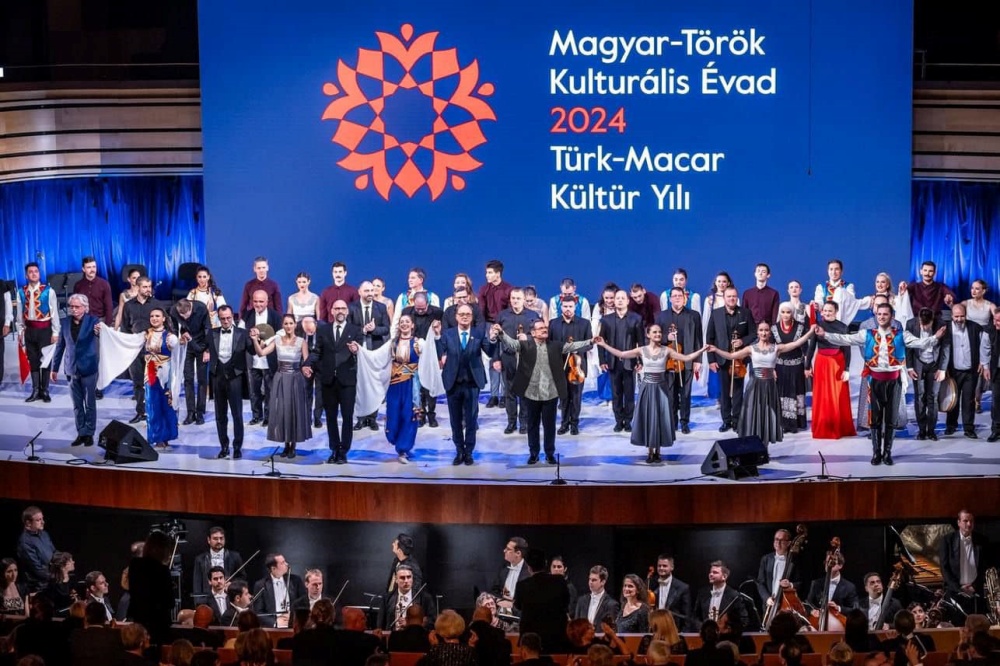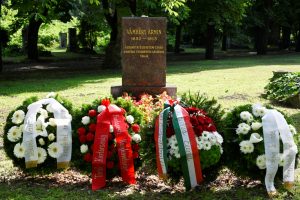
The two countries are honoring 100 years of diplomatic relations with 100 programs.Continue reading

The Hungarian-Turkish Cultural Year, marking the 100th anniversary of the establishment of diplomatic relations between the two countries, is now at its halfway point.
The season was launched with the slogan ‘100 events in the 100th year,’ and more than 70 cultural programs have already been organized in Hungary in the first half of 2024, Gülsen Karanis, Ambassador of the Republic of Türkiye to Budapest, said at a press conference in Budapest on Tuesday. In addition to Budapest, the second half of the year will also see events in Győr, Debrecen, Bugac, and Szigetvár, for instance.
Péter Hoppál, the government commissioner responsible for the preparation and implementation of the cultural year, said that in the first part of the year, 87 events, including gala performances, exhibitions, workshops, literary, gastronomic, and children’s programs were organized in 15 municipalities in Turkey, including Istanbul, Ankara, Adana, İzmir, and Tekirdağ, in cooperation with 71 partners.
With this series of events,
we also aim to further deepen the already excellent friendship and relations between the two countries, and to bring our cultures, which have common roots going back thousands of years, closer together in the present day,”
said Hoppál.
In July, the Istanbul Jazz Festival with Hungarian performers will be held, an exhibition of Hungarian paintings from the 19th to the 20th centuries will open, the genre of operetta, considered a Hungarian heritage, will be presented, and in the autumn, sporting events, scientific conferences, contemporary photography, and painting exhibitions will be held.
Gülsen Karanis noted that one of the most prestigious events of the cultural season will be celebrated on October 29, at the Budapest Music Academy and the Kölcsey Center in Debrecen, with the Presidential Symphony Orchestra.
In Debrecen, Anadol Refik’s digital collection will be presented, and in November, a performance of Murad IV will be shown at the Budapest Operetta Theater. The closing event will take place on December 18 at the Ataturk Cultural Center in Istanbul. She also pointed out that in 2025, Türkiye and Hungary will work together under the motto, “Year of Science and Innovation.”
On Tuesday, in the framework of the Hungarian-Turkish cultural year, six protected and restored tombs with Turkish significance were inaugurated in the Fiume Road Graveyard.
Gábor Móczár, director general of the National Heritage Institute (NÖRI), the organizer of the ceremony, said that as part of the commemorative year, NÖRI had the gravestones of those who are in some way connected to the common past of Hungarians and Turks renovated. Thus, the tombstone of linguist Ármin Vámbéry, who was a researcher and advocate of the theory of Turkic-Hungarian ethnic and linguistic relations, was renewed. Next to his, is the tomb of Zoltán Gombocz, a linguist, university professor, and director of the Eötvös Collegium, who made fundamental new advances in the research of Bulgarian-Turkish and Ob-Ugric elements of the Hungarian vocabulary.

Tomb of Ámin Vámbéry. Photo: MTI/Lakatos Péter
Two graves have also been renewed in Farkasrét Cemetery: the grave of linguist Lajos Ligeti, a world-famous Hungarian research professor of Altaic languages, and that of historian Ferenc Szakály, who studied the history of the Turkish occupation of Hungary, the time of Mátyás Hunyadi and the Hungarian-Ottoman wars.
In the Kozma Street Cemetery, the tomb of Ignác Kunos, a linguist who was one of the most renowned Turkish scholars of his time in Europe thanks to his unique and pioneering collections of Turkish folklore, has also been renewed. The tomb of Gyula Németh, a linguist and author of the first Turkish grammar book, in the Déli cemetery in Karcag, was restored as well.
The six tombs were restored by the National Heritage Institute with nearly HUF 8 million (EUR 20,200),
the director-general stressed.
The director also pointed out that in the Protestant cemetery in the Feriköy district of Istanbul, the tombs of Francis II Rákóczi’s doctor, Jakab Lang Lagentali, and the Turkish interpreter of Lajos Kossuth, Imre Cseh Csernátoni, and the renowned manuscript collector Dániel Szilágyi were also renewed.
Gülsen Karanis, who was also present at the event, stressed that it was a special pleasure for her that the tomb of one of the founding fathers of Hungarian Turkology could be renewed on the centenary of Turkish-Hungarian cultural relations.
Ármin Vámbéry is the founder of Hungarian Turkology, who established and raised the level of Oriental studies,
the ambassador pointed out, noting that a department of Hungarian Studies has also been established in Ankara, where research is carried out at a high level.
She said that the Turks had been at war with the Hungarians for several centuries, but today the two peoples, having left warfare behind them, regard each other as friends. This relationship is still strong and stable today, the ambassador concluded.
Via MTI, Featured image: Facebook/Macar-Türk Kültür Yılı